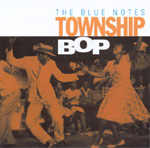Notes of Joy and Exile THE BLUE NOTES : Township Bop (Proper Records. PRP CD 013) | |

|
The history of South Africa's Blue Notes has been one of triumph and tragedy. They overcame every obstacle apartheid could put before them and played together as a mixed race band. Seeing no end to the regime they left their homeland and brought the spirit and fire of their music to a wider audience and much acclaim in Europe and Britain. They were also the foundation upon which the unique Brotherhood Of Breath was established. Unfortunately they also had to endure exile, a state which may have contributed to the early deaths of five of the classic sextet. Now drummer, Louis Moholo is the only one remaining. Just like Jimmy Cobb, the last survivor of that sextet which recorded 'Kind Of Blue'. At times on these pieces, recorded in Cape Town early in 1964, I can hear shades of that other band. Chris McGregor's composition, 'Vortex Special' reminds me of a slightly less polished 'So What'. It is equally mesmeric. Nick Moyake's tenor may not have the compressed power of Coltrane but it carries it's own authority. Moholo keeps uncluttered time and McGregor lays down a cool, melodic piano solo. He also features on the ballad 'Never Let Me Go' playing with delicacy and controlled emotion. One of his closest associates, Dudu Pukwana, joins him. His alto could often explode with a range of emotions. Here he is restrained, lyrical and stately. In fact, Pukwana contributes the majority of the tunes , including a swaggering 'Izithunywa' which showcases the irrepressible, much missed Mongesi Feza. His trumpet fizzes with barely contained energy on this and other tracks. 'Coming Home', one of the band's standards, with its joyous theme, expresses how Pukwana felt during a return to the Cape Province. And equally exuberant are the two takes of his 'The Blessing Light' which feature another memorable theme and relaxed soloing. Some tunes became a regular feature of the band' repertoire, 'Now' (or 'Manje'), was one of McGregor's. It was gradually extended in performance over the years, culminating in its lengthy appearance on 'Blue Notes In Concert : Vol. One', their 1977 classic on the Ogun label. Here, in a shorter version, it highlights the mellow soloing of both Moyake and Pukwana. It is quite simply a classic slice of bop. It is also partial evidence, for me, that Chris McGregor never received enough credit for his skills as composer or, for that matter, pianist. Perhaps his achievement as leader of the sprawling, joyful Brotherhood overshadowed his other work. To an extent, his voice became submerged within that ensemble's collective fire. This set allows him a greater chance to be heard. He was, of course, also a huge admirer of Ellington so it seems fitting that they have included two of the Duke's compositions here, 'Take The Coltrane' and 'Angelica'. The former has the sort of energies I associate with Charlie Parker's late Forties recordings with Miles Davis. It is a real pleasure to hear them tear through it. These recordings are not flawless. They do contain the occasional goof in the horn section and sometimes the sound is a little boxy. Maybe the South African Broadcasting Corporation never thought they would see the light of day. Considering SABC was the channel through which the voice of apartheid spoke it is a small miracle these tracks exist at all. But they do and they stand as vehicles for both anger and joy. And, despite the tribulations that followed their respective careers, joy is what I most associate with these musicians. It is here in abundance. Don't take my word for it. © Paul Donnelly 2002 |